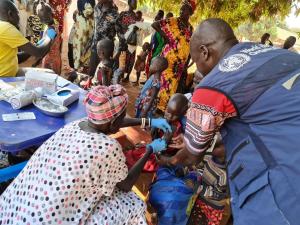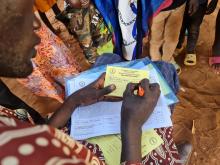South Sudan commemorates 50 Years of Immunization with 2024 African Immunization Week - Humanly Possible: Immunization for All
Juba, 30 April 2024 - This year, as the world commemorates World Immunization Week from April 24 to April 30, South Sudan joins the global community in celebrating the monumental 50th anniversary of the Expanded Programme on Immunization (EPI). This milestone highlights the transformative power of vaccines, which have significantly decreased child mortality rates globally. They lead to elevated health standards by reducing or eradicating the prevalence of critical diseases, such as eradicating smallpox and reducing the wild poliovirus to two countries.
In 1974, only 5% of the world’s children had been vaccinated against diphtheria, tetanus, and pertussis. That figure has increased to nearly 85% of children worldwide and 73% in South Sudan today.
Smallpox was eradicated some five years after the birth of the EPI. Since then, the wild poliovirus has been geographically limited to only two countries, and the threat of several serious infectious childhood diseases has also been reduced. Through innovation and technology, new vaccines, including the malaria and COVID-19 vaccines, have been developed that can protect against even more diseases today.
This year, World Immunization Week celebrates and recognizes our collective efforts to save and improve countless lives from vaccine-preventable diseases and underscores that immunization for all is humanly possible!
“We must increase vaccination coverage to safeguard children against vaccine-preventable diseases," said Hon. Yolanda Awel Deng, Minister of Health. "Unfortunately, routine vaccination coverage against these diseases remains low in South Sudan, leaving many children vulnerable to childhood illnesses. Therefore, the significance of vaccination campaigns cannot be overstated."
Over the past five years, vaccination rates among infants have significantly improved. According to the World Health Organization (WHO) and UNICEF’s estimates of national immunization coverage (WUENIC), the percentage of children under one-year-old who received the third dose of the DPT vaccine—which protects against diphtheria, pertussis (whooping cough), and tetanus—increased from 59% in 2018 to 73% in 2022.
Given the challenging context of the country and the suboptimal immunization coverage, there have been outbreaks of yellow fever, measles, and vaccine-derived poliovirus cases. These were promptly responded to this year by the Ministry of Health, providing opportunities to 465 798 people 9 months- 60 years in five affected counties in WES to be vaccinated with yellow fever vaccine, 115 981 children under 15 years reached with measles vaccine in three counties and 3,083,515 children under five nationwide vaccinated with the novel oral polio vaccine type 2 (nOPV2).
“Vaccines save lives. WHO works with countries across the globe to raise awareness of the value of vaccines and immunization. It ensures that governments obtain the necessary guidance and technical support to implement high-quality immunization programmes. They have been proven to reduce illness and deaths among children in the African Region. For 50 years, the Expanded Programme on Immunization (EPI) has focused on protecting children from diseases like tuberculosis, diphtheria, tetanus, pertussis, polio, and measles. Today, this number has grown to 13 universally recommended vaccines across the life course. Vaccines prevent serious diseases and save lives,” said Dr Humphrey Karamagi, the WHO Representative for South Sudan.
Celebrating Immunization Week, Hamida Lasseko, UNICEF Representative in South Sudan, said, “Immunization is not just a medical achievement; it's a testament to our shared commitment to safeguarding lives and ensuring a healthier future for all. As we mark 50 years of the Expanded Programme on Immunization, let us renew our dedication to reaching every child, every family, and every community with the life-saving protection of vaccines. Together, we prove that immunization for all is not just a goal; it's our collective duty, and it's humanly possible."
In response to the COVID-19 pandemic, South Sudan engaged in vigorous efforts to deploy the Covid-19 vaccine. Over 5 million people aged 18 and above, accounting for 82% of the target, have been vaccinated with the primary series, and efforts are being made to integrate the vaccine into the routine immunization and primary healthcare system.
South Sudan joins the world in celebrating the 50 years of the Expanded Program on
Immunization and, with its partners, reaffirms its unwavering commitment to ensuring equitable immunization services reach every corner of the country to leave no one behind.
With the support of Gavi, the vaccine alliance, the country is set to introduce the malaria vaccine into its routine immunization system by July 2024. By 2025, Gavi is also supporting the introduction of the Pneumococcal conjugate vaccine (PCV) and Rota Virus vaccine (RVV) into the immunization system in the country to protect children against Pneumonia, and diarrhea will be introduced.
South Sudan urges all communities, traditional and religious leaders and institutions, and indeed national and international partners to continue to support the drive to increase immunization coverage in the country and extend vaccination to the second year of life as immunization remains the most cost-effective public health intervention to prevent diseases.
About the Ministry of Health of South Sudan: The Ministry of Health of South Sudan is dedicated to promoting the health and well-being of the nation's population through comprehensive healthcare initiatives, disease prevention programs, and capacity-building efforts. With a steadfast commitment to achieving universal health coverage and combating infectious diseases, the Ministry collaborates closely with national and international partners to address the health challenges facing South Sudan.
About UNICEF: UNICEF works in over 190 countries and territories to save children's lives, defend their rights, and help them fulfill their potential from early childhood through adolescence. As the world's leading organization for children, UNICEF tirelessly reaches the most vulnerable and marginalized children, providing health care, nutrition, education, and protection services that transform lives and build brighter futures.
About the World Health Organization (WHO): Founded in 1948, WHO is the United Nations agency that connects nations, partners and people to promote health, keep the world safe and serve the vulnerable – so everyone, everywhere can attain the highest level of health. WHO leads global efforts to expand universal health coverage. We direct and coordinate the world’s response to health emergencies. And we promote healthier lives – from pregnancy care through old age. Our Triple Billion targets outline an ambitious plan for the world to achieve good health for all using science-based policies and programmes.
For media inquiries, please contact:
Ministry of Health: Mary Denis Obat, Director of Health Education and Promotion, mobat43 [at] gmail.com (mobat43[at]gmail[dot]com)
WHO: Jemila M. Ebrahim, Communication Officer, ebrahimj [at] who.int (ebrahimj[at]who[dot]int)
UNICEF: Ms. Alexandra Correia Reis, Chief of Communications, acorreiareis [at] unicef.org (acorreiareis[at]unicef[dot]org)
Communications Officer
Mobile: +211 921 647 859
Email: ebrahimj [at] who.int (ebrahimj[at]who[dot]int)
Communication Officer
Mobile: +211 921736375
Email: atema [at] who.int (atema[at]who[dot]int)





